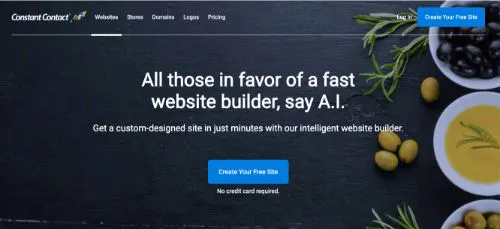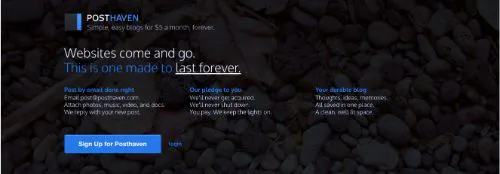Today, there are nearly 32 million blogs in the U.S. alone, and the number continues to rise each year. As websites have become more connected with social networks, there has been a real push for quality content, with blogs remaining one of the best ways to publish ideas in a structured and useful way. Personal blogs allow individuals to connect with others who share common interests or, in some cases, even launch their own businesses. Microblogging on social networks has also become a popular and widely used way to share content in recent years.
For businesses, blogs continue to help brands differentiate themselves and improve their visibility. In 2019, nearly 55% of marketers listed blog content creation as their top inbound marketing priority, according to HubSpot. It is clear that blogs are here to stay, making it important for content creators to find the right publishing platforms and content management systems (CMS) for their needs. Some blogging platforms may be easy to use but offer limited tools for customization, while others may support advanced editing but could be complicated to manage over time. It’s important for each blogger or team to consider their specific skills and needs before committing to a particular platform.
We compiled this list of the 50 best blogging platforms we could find to help you choose a home for your content. Our list includes both paid and free options, so you can find a blogging platform that fits your budget, too. The following 50 blogging platforms are listed alphabetically by category (paid and free), but otherwise, they’re not ranked or rated in any way.
Paid Blogging Platforms
1. Blot

Blot is a streamlined blogging platform that has been around since 2014 and allows you to post without using a dedicated interface or editor. Users simply create plain text files using their favorite text editors, and Blot then coverts them into blog posts automatically. Each blog costs $3/month, which gives you 1TB of combined bandwidth and data storage per year.
Key Features:
- Simple and streamlined payment and blog hosting platform
- Automatically converts text files into blog posts
- Use your favorite text editors to create posts
Price: $3/mo
2. Cargo

Cargo is a simple website builder that gives you over 60 templates to choose from to design your site. The platform is free to try and build an initial site, and you can pay at the point you wish to make the content public. There are a number of design, layout, and content management tools available to users, and the site supports the integration of e-commerce for commercial blogs.
Key Features:
- An extensive library of premium typography
- Cloud-based image storage up to 6GB
- Over 60 fully customizable website templates
Price: $13/mo or $99/yr
3. CodePen

Codepen is a social development environment that has been created for front-end designers and developers. Users can build and release a website on Codepen and share their work with others to share programming knowledge, learn from each other, and find new ideas for website code through the work of others. It is well-suited for highly technical bloggers who want a hands-on approach to building their website.
Key Features:
- A fully featured editor for building and testing website design
- An active community of over 1.8 million designs and developers
- A professor mode for sharing real-time site updates with students
Price: Free – $26/mo

Email marketing software Constant Contact offers a website builder through their site that can help you create a functional blog in minutes. The builder uses A.I. to create the website based on some questions about your intended use and preferences. It’s a great choice for bloggers who want to create a platform quickly and are interested in email marketing and e-commerce.
Key Features:
- Integration with Unsplash for over 550,000 free images
- A content delivery network (CDN) is provided for fast loading
- Customize details of your blog with a powerful editor
Price: Free – $20/mo
5. Craft

Craft is a full-featured content management system (CMS) that gives you complete control over your website coding and design. It is intended for technical bloggers who are familiar with the details of website design. The intuitive control panel makes it easy to create your desired content layouts, and you can customize nearly every aspect of your site. Craft is free for personal sites, and premium plans are available for commercial use.
Key Features:
- Integrations with web platforms like Mailchimp and Stripe
- View your work-in-progress with a Live Preview
- Design a website from scratch will full developer tools
Price: Free – $999/project
6. edublogs

Edublogs is a website design platform that has been created to help individual educators share content with their students. The designer is powered by WordPress and the team at Edublogs has included a number of features, themes, and plugins suitable for education blogs. Users get 1GB of storage and basic features with the free plan, and a Pro version is available that allows full search engine indexing and additional tools.
Key Features:
- Access to over 250 premium themes
- Manage privacy and password protection for your content
- Add students to classes and groups for easy management
Price: Free – $7.95+/mo
7. emyspot

Emyspot is a hosted website builder and CMS that can be used to create a fully-immersive blog or e-commerce platform. The basic interface and editor is easy-to-use, and there are a number of tools available for SEO optimization, multilingual support, and newsletter management. Users of the free version will have ads displayed on their blogs, and a number for paid plans are available for additional storage and capabilities.
Key Features:
- A page builder tool for creating dynamic content
- Build forums, quizzes, and polls with included add-ons
- Activate tools for web community management
Price: Free – $31/mo
8. Gator

Gator, a website builder from HostGator, features a drag-and-drop website designer that makes it easy to create your blog without over-complicating the process. Their template library has offerings that are perfectly suited for blogging, and you can also manage analytics and social media feed integration for your account. HostGator also offers support via telephone, LiveChat, and email at any time.
Key Features:
- A My Social Suite app for adding social feeds directly to your site
- Domain transfer available for moving an existing site
- $200 ad voucher offered with all plans
Price: $2.69-$6.46/mo
9. Ghost

Ghost is an open-source, non-profit, and completely independent website publishing platform. Ghost includes a number of useful publishing features such as native SEO optimization and content management. There are also audience membership tools that allow you to set up subscription payments and create paid publications and newsletters.
Key Features:
- Integrations available with hundreds of other tools
- Create paid content subscriptions with no transaction fees
- Native desktop and mobile apps
Price: $29-$249/mo
10. LiveJournal

LiveJournal is a community publishing platform that connects your content with a network of other users. It combines the functions of blogging with a social network and is a great option for bloggers looking to share their ideas directly with an audience and build connections with other users. The journals on the platform can be completely customized, and LiveJournal is available in numerous languages and has a truly global user base.
Key Features:
- Create content through a web interface, iPhone app, or Android app
- Access communities dedicated to particular topics
- Over 50 million journals active on the platform
Price: Free – $19.95/mo
11. Moonfruit

Moonfruit aims to make the process of building a website as easy as possible. Ready-made templates and a simple drag-and-drop interface make it easy to design your blog layout, and Moonfruit has advanced tools for managing hosting, domain, stock imagery, and SEO. Users can begin with a 14-day free trial to get familiar with the tools, and paid plans are available for continued blog development and publishing.
Key Features:
- Easy to use site editor with ready-made templates
- Built-in image editor for updating files prior to posting
- Add background effects directly to your pages
Price: $5.99-$11.99/mo
12. Movable Type

Moveable Type is one of the original major blogging platforms and has been active since 2001. The current version, Moveable Type 7, is available through Amazon Web Services (AWS) and is a fully-functional CMS. Bloggers will find that websites are easy to build using the included templates. You can access your admin dashboard via a web URL or mobile apps for convenient monitoring and content updates.
Key Features:
- Support for both static and dynamic publishing
- Create unlimited blogs with unique publishing options
- Manually configure your admin screen URL for added security
Price: $499/yr
13. Open Diary

Open Diary is a unique blogging experience where all posts are anonymously shared with the user base. As an online community dedicated to open sharing and treating all members equally, Open Diary allows you to blog about anything that you wish without fear of judgment. It can be a great option for those new to blogging or anyone who wants to share very personal thoughts with a community.
Key Features:
- Add tags to posts following trending subjects
- Diary Circles available for specific interests
- Customize your own reading feed
Price: $3.99/mo
14. Posthaven

Posthaven was created as a long-term publishing platform, and the operators have vowed to remain independent. This is an important consideration for bloggers who want to keep their content in a single location for many years to come. There is a simple pricing structure of $5 per month, and you can easily create new posts for your blog via email.
Key Features:
- Simple $5 per month pricing structure
- An independent platform built to last forever
- Create posts by submitting media and content via email
Price: $5/mo
15. Squarespace

Squarespace is a popular commercial site builder that lets you create a website from a series of templates. With Squarespace, you can easily create a new blog that looks professional in a short time, and the website builder also includes numerous tools for customization. They offer live webinars showing you how to improve your content and have an active 24/7 customer support team.
Key Features:
- Award-winning website template collection
- Create a full e-commerce experience for business blogs
- Comprehensive email marketing tools included
Price: $12-$46/mo
16. Strikingly

Strikingly is focused on providing users with beautiful sites that can be designed using a simple interface. From a central dashboard, you can use the design editor and modify all aspects of your site content with a few simple clicks. The blogging feature creates an individual page for each post, making it easier to organize your site structure. You can also access a newsletter creator, analytics, and media tools for creating advanced content.
Key Features:
- Add social feeds directly to your site
- Easily view, manage, and send newsletters
- Built-in HTTPS for added security
Price: Free – $49/mo
17. Svbtle

Svbtle is a sleek modern publishing platform that prides itself on providing the creative tools you need to make great posts while removing everything that you don’t. It’s built with writing in mind and allows you to curate a list of post ideas and works-in-progress that can then be turned into full blog articles when they’re ready. Svbtle also vows to keep any content you create on their platform forever.
Key Features:
- Manage draft posts and ideas from the central dashboard
- A simple to use article creation format called Markdown
- Add footnotes, code blocks, or raw HTML to pages
Price: $6/mo
18. Typepad

Typepad makes it easy for bloggers to publish new content using a computer, mobile device, or email. Users can also fully customize their site using one of the built-in themes or design a template of their own. The support team at Typepad is easy to contact to help you overcome any issues, and they offer a 14-day free trial so you can try out the platform before considering a subscription.
Key Features:
- Modify a theme directly with custom CSS
- Monitor your blog and audience with Google Analytics
- Fully optimized for search engine and social discovery
Price: $8.95-$49.95/mo
19. uCoz

uCoz is a website builder that is geared towards creating personal websites. The website designer and template library make your blog setup easy, and you can manage your site with a number of included modules such as site statistics, RSS import, and mail forms. One of the unique features of uCoz is the landing page designer, where you can create and launch a page in minutes and include A/B testing to optimize your engagement.
Key Features:
- Create calculators and forms
- Intuitive drag-and-drop functionality
- Choose from hundreds of free and premium site templates
Price: Free – $15.99/mo
20. uKit

uKit is a professional commercial website design platform that is targeted to businesses. It comes from the same company that offers uCoz and has a bunch of added features for achieving business growth through a website. For bloggers, it could be a great choice if you are looking to grow your following as part of a commercial endeavor.
Key Features:
- Unlimited pages, photos, video, and traffic
- Visual editor with easy drag and drop elements
- Complete online store integration is included
Price: $2.50-$15/mo
21. Virb

Virb is a commercial website hosting platform with a site builder that is intuitive and easy to use. Bloggers who try this software will find a simple interface, and themes can be loaded and customized in little time. Virb also offers video tutorials, making it even easier to get started, and its global content delivery network (CDN) keeps site content and images loading rapidly.
Key Features:
- Integrations with music, image, blogging, and e-commerce apps
- Numerous page types for displaying your content
- Built-in cloud hosting for your files
Price: $10/mo
22. Voog

Voog is a front-end site builder that is targeted to agencies, designers, and developers. They provide streamlined tools that anyone can use to build a basic site but also offer full customization through an open API. There is also wide support for global e-commerce sites with capabilities for multilingual sites in 10 languages, built-in analytics, and SEO-friendly design.
Key Features:
- Support for multilingual websites
- Optimized for display on desktop, tablet, and mobile
- Built on open standards that can be fully customized
Price: €8-€50/mo
23. Webflow

Webflow focuses on giving site owners all the tools they need to get a fully-optimized website built and launched with ease. The core feature is the Webflow Designer that gives you control of HTML, CSS3, and Javascript through a visual interface with no coding required. You can also join and only pay upon launch, giving you the time to create and design the exact blog you desire.
Key Features:
- Webflow University, courses, ebooks, and forum
- 99.9% uptime with no maintenance required
- Built-in SEO tools like metadata controls and canonical tags
Price: Free – $45/mo
24. Webnode

Webnode is a great choice for bloggers who want to design and launch their website quickly. Users can choose from a set of pre-built templates, and there are options available for business and personal sites. All their websites are mobile-ready, and you can easily add an online store to your website at any time. A number of subscription plans are available allowing you to adapt as your blog grows.
Key Features:
- Optimized for both personal and business blogs
- An active community of over 30 million users
- Mobile-ready for optimized viewing on all devices
Price: Free – $19.95/mo
25. Webs

The Webs platform allows users to design and build websites through a completely browser-based interface. To get started with your blog, you simply load one of the pre-designed templates and drag your desired elements onto the pages. Webs is a subsidiary of Vistaprint, and you can tell that they take the design elements very seriously, offering simple tools that are accessible to anyone.
Key Features:
- A simple SEO tool for measuring post optimization
- Easily integrate social networks with your website
- Professionally designed site templates
Price: $5.99-$22.99/mo
26. WebStarts

WebStarts is a simple site builder with some unique features for running an immersive blog. In addition to basic design tools, the platform gives you the ability to add media with free video hosting, a live chat, and an online store. Users can choose from over 700 fonts, and WebStarts has an extensive stock image library for filling your posts with high-quality photos.
Key Features:
- A large image library of stock images
- Add live chat to your website
- Free video hosting for sharing on your site
Price: Free – $19.99/mo
27. Webydo

Webydo is a commercial website design platform that is targeted to designers and agencies that build websites for clients. It allows users to drag and drop elements into a virtual canvas to create web pages without the need for any coding. It could be a great choice for bloggers that have a creative eye and want more control over their design.
Key Features:
- Intuitive design editor with drag-and-drop canvas
- Optimized for user experience on all devices
- Built-in CMS for easy content updates
Price: $75-$480+/mo
28. Weebly

Weebly is a site builder that offers you all the tools you need to set up a fully functional business and e-commerce website. Its core target market is creative entrepreneurs, and it is well-suited for bloggers looking to sell products and promote a brand with their writing. As a subsidiary of Square, Weebly has complete integration with Square payment processing, and they offer a step-by-step guide to help new users get started.
Key Features:
- A step-by-step guide provided for website build and launch
- Full support of Square payment processing
- Integrated marketing tools like Facebook ads and email campaigns
Price: Free – $29/mo
29. Wix

Wix has gotten a lot of attention for its free website builder and easy to use customization tools. They offer automated tools such as Artificial Design Intelligence (ADI) to help you build your site by answering a few simple questions. In addition to these capabilities, there is also an open API available that designers can utilize for detailed customization.
Key Features:
- Over 500 designer-made site templates
- Edit and personalize your mobile view
- Use Artificial Design Intelligence to build a website quickly
Price:$13-$39/mo
30. WordPress.com

WordPress.com has all the basic capabilities you need to get your blog up and running without needing to worry about hosting and security. It’s a perfect platform for personal users, freelancers, and small businesses to create a professional-looking website. New users can get started for free, and plans begin as low as $4 per month with access to 24/7 support.
Key Features:
- Subscription plans tailored to personal and business user needs
- 24/7 support available with real engineers
- Storage and design options available for creating a portfolio
Price: Free – $45/mo
31. Write.as

Write.as is a minimalist publishing platform that focuses on user privacy and remaining independent. The user interface is built for writing and has no clutter, allowing you to focus on your work and thoughts. Integrations are available for publishing directly to other platforms such as Tumblr and Twitter. Subscriptions are available for individual bloggers or for teams that need additional collaboration features.
Key Features:
- Completely independent platform
- No tracking or sharing of personal data
- An active community of other bloggers and readers
Price: Free – $240/mo
32. Yola

Yola offers a fast and free site builder for creating your website without ads or distractions. Businesses will benefit from tools such as appointment scheduling, mailing list management, and an integrated online store. It is best suited for commercial bloggers and entrepreneurs who want to sell to an audience.
Key Features:
- HTML-based pages optimized for search engine recognition
- Flexible site layouts based on preset templates
- Create and post a basic ad-free website for free
Price: Free – $19.95/mo
Free Blogging Platforms
33. Blogger

Blogger was one of the first blogging platforms available on the web, and you can get up and running with just a few clicks. Users are assigned a free blogspot.com domain and can select from an assortment of easy-to-load templates. Blogger is owned by Google and is optimized for displaying Google AdSense ads for monetization and connecting to Google Analytics.
Key Features:
- A free domain assigned with each blog
- Easily add Google AdSense to your blog
- Store your posts, photos, and media with Google for free
Price: Free
34. Drupal

Drupal is a completely open-source content management system (CMS) that you can install on a local webserver. It is mostly utilized by large enterprises that are looking for a self-hosted solution for their website and publishing needs. Those who are looking for extensive development tools may find this to be a great option for starting a marketing or agency blog.
Key Features:
- A large open-source community of over 1 million users
- Multi-channel reach across multiple platforms
- Easy content authoring tools for post creation
Price: Free
35. Facebook

Creating a presence on Facebook, one of the most prominent social media platforms, could be a great way for a blogger to develop their skills as a writer while testing out new strategies for audience engagement. With almost 2.5 billion active users, Facebook has a massive community, and the platform allows you to create custom pages for your projects that can contain unique content and posts.
Key Features:
- Join or create groups based on particular interests
- An active user base of over 2.4 billion users
- Instant message and interact with followers
Price: Free
36. HubPages

HubPages is a user-generated content and revenue-sharing website where contributors add articles called “hubs.” Members can join for free and begin to write articles in any of the many categories on the site. It can be a great platform for bloggers to share their expertise while also having the opportunity to monetize the platform over time using Google AdSense.
Key Features:
- Interact with followers in forums and chat
- Contribute articles to many different categories
- Earn money for articles via Google AdSense
Price: Free
37. Hugo

Hugo is an open-source framework for building static sites. It must be hosted on a local server or CDN and is built for speed and development flexibility. Supported by an active community of developers, Hugo offers tools for custom website creation or building a basic site from over 300 provided templates. Bloggers might be interested in Hugo if they are looking for a flexible design platform that allows extensive customization.
Key Features:
- Output content in multiple formats including JSON and AMP
- Unlimited content types, menus, and dynamic API-driven content
- A super-fast load time of <1 ms per page
Price: Free
38. Jekyll

Jekyll is an open-source static site generator that is a great option for developers who are looking for a simple platform for launching their blog. Users must be familiar with coding languages to use Jekyll, and you can use Markdown, Liquid, HTML, and CSS to build your website content. There is also a function to migrate your blog from another location so that you can take control and customize the coding.
Key Features:
- Support for Markdown, Liquid, HTML, and CSS
- Update permalink, categories, pages, and posts
- Free hosting available with GitHub Pages
Price: Free
39. Joomla

Joomla is an open-source and fully-featured content management system (CMS) that makes a great choice for bloggers looking for an alternative to WordPress. The developer base is extensive, and users have access to thousands of high-quality site templates and third-party extensions. Joomla also provides a ton of free documentation to help you get started and prepared to launch your website.
Key Features:
- Over 70 translation packs available for multilingual content
- Free forever open source software
- Build powerful PHP apps with the Joomla Framework
Price: Free
40. LinkedIn

LinkedIn Pulse offers users the ability to post full articles for sharing with their connections and the entire network of over 630 million members. As a massive social network for businesses and professionals, LinkedIn is a great option for bloggers looking to share articles with a professional audience. It is also a great opportunity to diversify your content across another platform.
Key Features:
- View your own custom feed of popular articles
- Connect with the extensive LinkedIn community
- Automatic SEO with keyword recognition
Price: Free
41. Instagram

Active blogging involves so much more than just posting content, and with Instagram, bloggers can take advantage of the visual nature of the feeds to tell their stories from a unique angle. Users can add hashtags to each post to expand visibility, and it is possible to link your content to your other platforms. It’s a great option for promoting photos and telling visual stories.
Key Features:
- Create public or private profiles
- Manage comments, hashtags, and tagging in your posts
- Connect posts to other users with @mentions
Price: Free
42. Medium

Medium has become a popular platform for writers to share their work with an engaged audience of readers. As a blogger, you can share your articles in an ad-free environment where you can get recognized as your content is recommended by readers. It is free for writers to contribute.
Key Features:
- Posts are organized by popular topics for greater visibility
- Over 60 million visitors per month
- View enhanced stats about the reach of your posts
Price: Free
43. Myspace

Myspace has been eclipsed by the rapid growth of many other social networks in recent years, but it still remains an active community. Bloggers may find the support for music and video playback useful if they are producing media content for their audience. The strength of Myspace is the multimedia focus of its apps and web interface, which make it an interesting alternative to Facebook and YouTube.
Key Features:
- Customize profile page and individual posts
- Tools for discovering music and video content
- Search articles across all pages on the site
Price: Free
44. Postach.io

Postach.io is a blogging platform that is powered by Evernote and does not have its own interface. It allows you to write, publish, and manage blog posts directly from Evernote, and the formatting for your blog posts will be based on Evernote’s functions for notebook pages. You can add tables, graphs, and images to each post,and there are a few basic templates provided for building your blog layout.
Key Features:
- Write and publish blog posts directly from Evernote
- Use Google Analytics to monitor site performance
- Choose from basic templates for site creation
Price: Free
45. Telegraph

Telegraph is quite possibly the simplest blogging platform that you can find. Anyone can publish anonymous blog posts directly from the Telegraph website. Posting is as easy as adding a title, your post, and hitting the publish button. The articles can be shared on other social media platforms or viewed in Telegram’s Instant View layout, which acts as a content feed.
Key Features:
- View articles in Telegram or share on social media
- Simple and easy publishing with a click
- Anonymous posting
Price: Free
46. Tumblr

Tumblr is a microblogging platform that is known for multimedia content and short-form posts. You can easily share photos, audio, and video content or create full-text blog posts. A great benefit of using a social network like this is the community that you can instantly connect with. Users are given a standard domain name upon sign-up, which can later be customized.
Key Features:
- Support for plain text, HTML, or Markdown post formats
- Quickly publish and tag posts from the main interface
- Customize a theme for your page with multiple layout options
Price: Free
47. Twitter

Twitter is a microblogging and social media platform that limits posts to 140 characters. It has become an important way for bloggers, influencers, and marketers to promote various products and share news. For bloggers, it can be a helpful forum for building up an audience and sharing real-time updates. The platform allows tagging and the ability to create a full user profile, and you can create longer “threads” by replying to your own posts.
Key Features:
- Popular microblogging platform with short 140 character posts
- Over 330 million global users
- Create Twitter Moments for sharing specific content
Price: Free
48. txt.fyi

Txt.fyi is a blogging platform for anonymous and no-nonsense posting. It was built to remove all quantifiers of social capital, and there are no likes, user accounts, or tracking of any kind. It is simply a simple and practical way for anyone to publish a post with just a click. It’s also worth noting that the site is not indexed and will not show up in search engines.
Key Features:
- Format posts using basic Markdown commands
- A completely independent and simple way to share ideas
- Not indexed or visible on search engines
Price: Free
49. TYPO3

TYPO3 is an open-source content management system (CMS) designed for enterprise deployments. It is designed for companies that want complete control of their websites, intranet, and online applications. Bloggers that are based in a corporate environment may find the customization useful for both internal and external blog content.
Key Features:
- An open-source and highly scalable platform
- Capable of multisite deployment in multiple languages
- Supported by an active community of developers and users
Price: Free
50. WordPress.org

Last but certainly not least, WordPress is the largest and most popular CMS and blogging platform used today, powering nearly a third of all sites on the web. As an open-source and self-hosted platform, users of WordPress benefit from the support of thousands of developers and contributors. Bloggers can use free tools and supporting resources to get started with a new, professional website with minimal effort.
Key Features:
- Highly secure and reliable platform
- Complete media management and customizable designs
- Create, modify, and publish posts easily
Price: Free
You put a lot of effort into finding the right blogging platform and creating top-notch, engaging content. Why not make it simple for your readers to share your blog posts on their favorite social networks? Install our social media share buttons on your blog today. Not only are they simple to install, but they’re also totally free to use!




